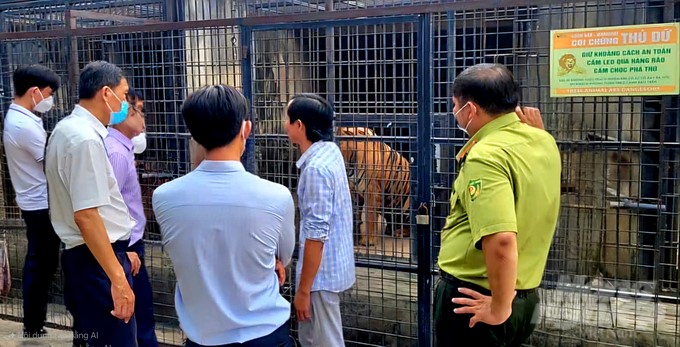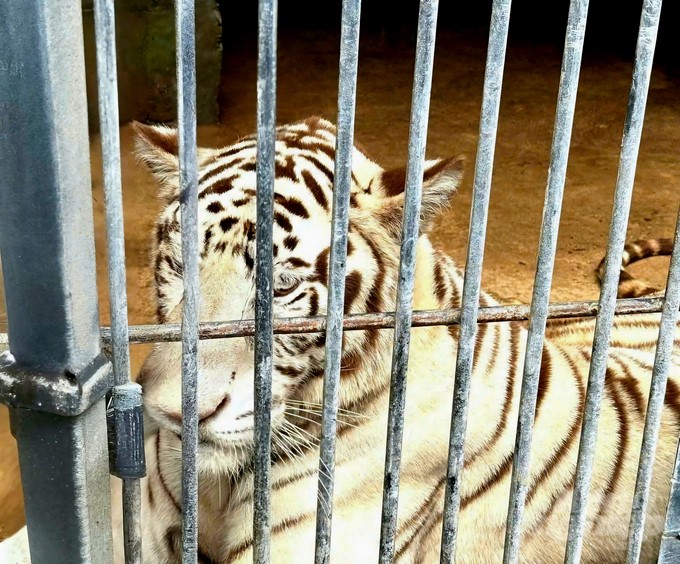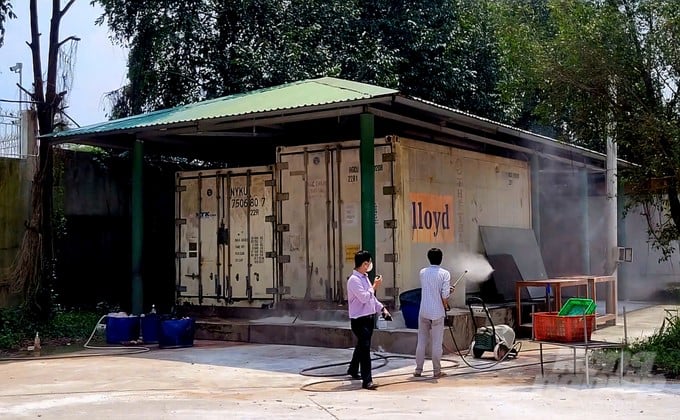June 17, 2025 | 23:13 GMT +7
June 17, 2025 | 23:13 GMT +7
Hotline: 0913.378.918
June 17, 2025 | 23:13 GMT +7
Hotline: 0913.378.918

The interdisciplinary delegation inspected the tiger farming area at the Mango Garden tourist area (Dong Nai). Photo: MV.
On October 2, Director of the Dong Nai Department of Health Le Quang Trung said that through investigation, there are a total of 30 people having contact with dead tigers. Their health is still normal; and no case of respiratory infection symptoms has been recorded. Veterinary forces also took samples of two dead tigers to test for influenza A/H5N1. However, as of now, the official cause of the deaths of tigers and leopards has not been determined. It was initially recorded that some tigers had pneumonia.
As reported by Vietnam Agriculture Newspaper, on the morning of October 2, Dong Nai's interdisciplinary delegation continued to inspect the reality at Mango Garden ecological tourist area (Dong Nai). Mr. Ngo Van Sang, Director of Mango Garden Ecotourism Area Co., Ltd., announced that on September 6, during the feeding process, staff discovered that some tigers had stopped eating, walked weakly, and had runny noses. Zoo veterinarians increased aggressive treatment with a number of antibiotics and antiviral medicines, but on September 8, the tiger began to die.
According to Mr. Sang, as of today (October 2), a total of 20 tigers and 1 leopard have died. The average weight of dead tigers is from 25 to 200 kg. Currently, the tigers' bodies are being preserved in refrigerated containers at the Mango Garden tourist area.
Mr. Nguyen Ba Phuc, a tiger care worker at the Mango Garden tourist area, said that tigers are raised on a large campus and are cared for and fed by staff every day with chickens purchased from outside. On September 6, the unit transported three tigers to My Quynh Zoo (Long An), and just a few days later, tigers at the Mango Garden tourist area showed signs of lethargy, loss of appetite, fever, and death.
After receiving information about many tigers at the Mango Garden tourist area dying, the Dong Nai Department of Health directed the Provincial Center for Disease Control and Prevention to coordinate with relevant departments and branches to investigate the cause. At the same time, monitor the health of all people who were exposed to these tigers.

A Bengal tiger has just gone through the illness and is gradually recovering. Photo: MV.
Previously, the Pasteur Institute in Ho Chi Minh City also announced the death of 27 tigers at My Quynh Zoo (Long An province) during the period from August to September 2024. Test samples of these tigers showed positive results for the avian influenza A/H5N1 virus. Among these 27 tigers, 3 were imported from Mango Garden Ecotourism Area Co., Ltd. (Dong Nai) on September 6, 2024.
The leadership representative of the Mango Garden tourist area said that in the tourist area, there currently remain 35 living Bengal tigers and other rare wildlife species that are being taken care of and strictly protected in face of many Bengal tigers and one black panther dying in just the last 3 weeks.
It is known that the total number of wild and rare animal species at the Mango Garden tourist area has now grown to tens of thousands of individuals. Among them, the largest number are crocodiles with more than 10,000 heads, thousands of ostriches, and hundreds of monkeys.
As soon as the tiger died, the Mango Garden tourist area coordinated with functional agencies to zone, take samples for testing, and disinfect the barn area. To avoid widespread infection, the tourist area has separated the tiger farming area and monitored all animals in the tourist area to ensure the safety of other animals.

Refrigerated containers containing dead tigers' bodies in the Mango Garden tourist area are being disinfected by staff. Photo: MV.
Mango Garden tourist area began operating in 2006 and is one of the oldest tourist areas in Dong Nai province, licensed to raise and care for many wildlife species. Among them are species that are extremely rare and difficult to care for but have successfully reproduced, such as Bengal tiger, rhino, hippo, giraffe, etc.
Translated by Thu Huyen

(VAN) According to the Binh Thuan Department of Industry and Trade, in the first five months of 2025, Binh Thuan's dragon fruit export turnover increased by 20.65% compared to the same period last year.

(VAN) EU countries on Thursday gave final approval to new tariffs on fertilizer imports from Russia, a move aimed at cutting off revenue that could support Moscow’s war in Ukraine, despite concerns from European farmers.

(VAN) The working delegation from the Ministry of Agriculture and Environment conducted an important trip to the Netherlands to strengthen strategic partnerships and sustainable development in the agricultural sector.

(VAN) The letter ‘A Plea from the Ocean’ not only evokes emotion but also awakens the human conscience to the responsibility of protecting life on Earth.

(VAN) The Department of Agriculture in South Africa has announced the country’s first mass vaccination of poultry to prevent local birds from contracting avian influenza.

(VAN) Establishment of the Mekong Delta Regional Agricultural Linkage Center, aiming for a closed value chain, deep processing, trading platforms, and international market connectivity.

(VAN) Gia Lai province has recently recorded 460 rare species of animals and plants, contributing to forest conservation and biodiversity planning in the region.